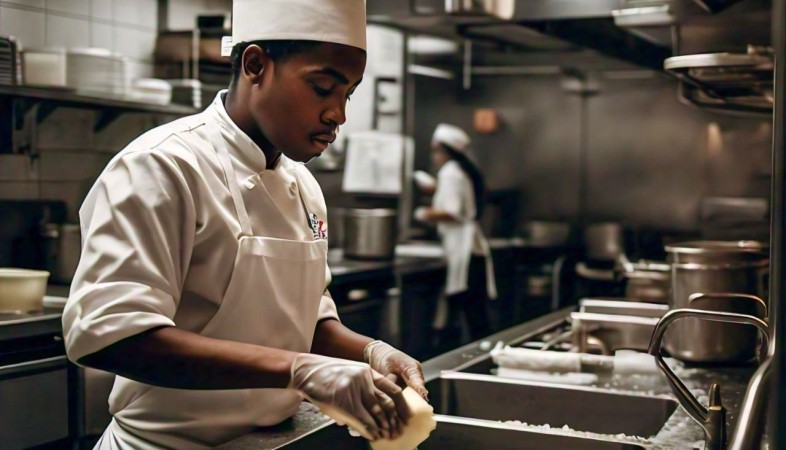Promoting Team Collaboration in Kitchen Stewarding
Creating a positive work environment is essential for fostering collaboration.
In the fast-paced environment of a hotel kitchen, effective
team collaboration is essential for ensuring smooth operations and maintaining
high standards of cleanliness and organization. Kitchen stewards play a
critical role in this ecosystem, and promoting collaboration among them can
lead to increased efficiency, better morale, and a more cohesive work
environment. Here are some strategies for fostering team collaboration in
kitchen stewarding.
Clear communication is the foundation of any successful team. In kitchen stewarding, it’s vital to establish clear channels of communication among team members. Regular team meetings can be an effective way to ensure everyone is on the same page regarding tasks, schedules, and any issues that may arise. Encouraging open dialogue allows team members to voice their concerns, share ideas, and offer solutions. Using communication tools such as walkie-talkies or mobile apps can also facilitate real-time coordination and problem-solving.
Defined roles and responsibilities help prevent confusion and ensure that all tasks are covered efficiently. Each team member should have a clear understanding of their specific duties and how they contribute to the overall operation. Cross-training can be beneficial, allowing team members to understand each other’s roles and step in when needed. This flexibility not only promotes collaboration but also ensures that the kitchen runs smoothly even when someone is absent or during peak times.
Encouraging mutual respect and support among team members is crucial. Fostering a culture of respect means recognizing and appreciating the contributions of each team member, regardless of their role. This can be achieved through regular acknowledgment of hard work, celebrating successes, and providing constructive feedback. When team members feel valued and respected, they are more likely to support one another and work collaboratively.
Effective leadership is key to promoting collaboration in any team. Kitchen steward supervisors should lead by example, demonstrating a collaborative attitude and a willingness to support their team. They should also be approachable and open to feedback, creating an environment where team members feel comfortable sharing their ideas and concerns. Good leaders facilitate collaboration by providing guidance, resources, and support, and by resolving conflicts promptly and fairly.
Team-building activities can significantly enhance collaboration by strengthening relationships and building trust among team members. These activities don’t have to be elaborate; simple exercises such as team lunches, group problem-solving tasks, or even casual social gatherings can help. The goal is to create opportunities for team members to connect on a personal level, fostering a sense of camaraderie and teamwork.
Providing the right tools and resources is essential for efficient collaboration. This includes ensuring that the kitchen is well-equipped with the necessary cleaning supplies, equipment, and technology to support the team’s work. Streamlining processes and eliminating unnecessary obstacles can help team members focus on their tasks and work together more effectively. Regularly reviewing and updating equipment and procedures can also contribute to a more efficient and collaborative work environment.
Training and development are crucial for promoting collaboration in kitchen stewarding. Continuous training helps team members stay updated on best practices, new technologies, and safety protocols. It also provides an opportunity for team members to develop their skills and advance in their careers. Offering workshops, seminars, and on-the-job training can enhance the team’s overall competence and confidence, leading to better collaboration and performance.
Creating a positive work environment is essential for fostering collaboration. This includes maintaining a clean, organized, and safe workspace, as well as promoting a positive attitude and work ethic. Encouraging a work-life balance and providing support for team members’ well-being can also contribute to a more motivated and cooperative team. When team members feel happy and supported in their work environment, they are more likely to collaborate effectively.
Setting common goals can unify the team and provide a shared sense of purpose. Whether it’s achieving a high standard of cleanliness, improving efficiency, or meeting specific targets, having clear, attainable goals can motivate the team to work together. Regularly reviewing progress and celebrating milestones can reinforce the importance of collaboration and keep the team focused and motivated.
Promoting team collaboration in kitchen stewarding involves clear communication, defined roles, mutual respect, effective leadership, team-building activities, the right tools and resources, ongoing training, a positive work environment, and common goals. By implementing these strategies, kitchen steward supervisors can create a cohesive and collaborative team that works efficiently and effectively, ultimately contributing to the overall success of the hotel’s operations.
.png)
















 at ITC Hotels.jpeg)












